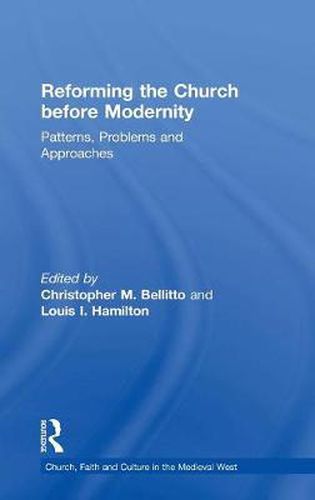Readings Newsletter
Become a Readings Member to make your shopping experience even easier.
Sign in or sign up for free!
You’re not far away from qualifying for FREE standard shipping within Australia
You’ve qualified for FREE standard shipping within Australia
The cart is loading…






Reforming the Church before Modernity considers the question of ecclesial reform from late antiquity to the 17th century, and tackles this complex question from primarily cultural perspectives, rather than the more usual institutional approaches. The common themes are social change, centres and peripheries of change, monasticism, and intellectuals and their relationship to reform. This innovative approach opens up the question of how religious reform took place and challenges existing ecclesiological models that remains too focussed on structures in a manner artificial for pre-modern Europe.
Several chapters specifically take issue with the problem of what constitutes reform, reformations, and historians’ notions of the periodization of reform, while in others the relationship between personal transformation and its broader social, political or ecclesial context emerges as a significant dynamic. Presenting essays from a distinguished international cast of scholars, the book makes an important contribution to the debates over ecclesiology and religious reform stimulated by the anniversary of Vatican II.
$9.00 standard shipping within Australia
FREE standard shipping within Australia for orders over $100.00
Express & International shipping calculated at checkout
Stock availability can be subject to change without notice. We recommend calling the shop or contacting our online team to check availability of low stock items. Please see our Shopping Online page for more details.
Reforming the Church before Modernity considers the question of ecclesial reform from late antiquity to the 17th century, and tackles this complex question from primarily cultural perspectives, rather than the more usual institutional approaches. The common themes are social change, centres and peripheries of change, monasticism, and intellectuals and their relationship to reform. This innovative approach opens up the question of how religious reform took place and challenges existing ecclesiological models that remains too focussed on structures in a manner artificial for pre-modern Europe.
Several chapters specifically take issue with the problem of what constitutes reform, reformations, and historians’ notions of the periodization of reform, while in others the relationship between personal transformation and its broader social, political or ecclesial context emerges as a significant dynamic. Presenting essays from a distinguished international cast of scholars, the book makes an important contribution to the debates over ecclesiology and religious reform stimulated by the anniversary of Vatican II.